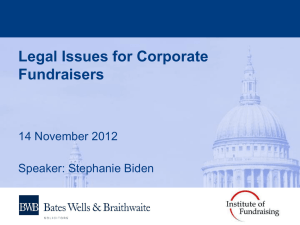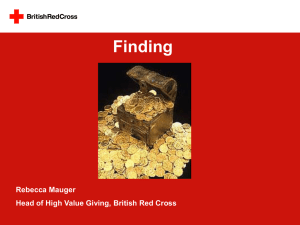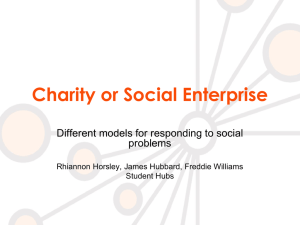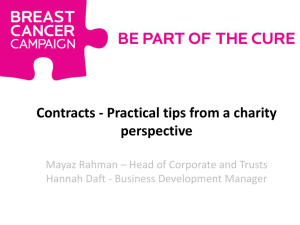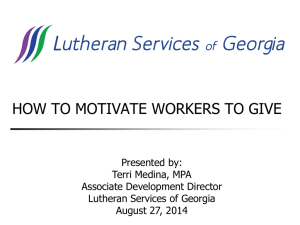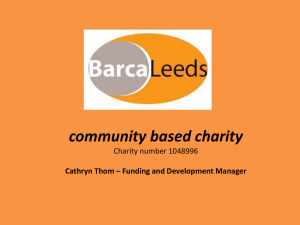Contracts and brand protection
advertisement
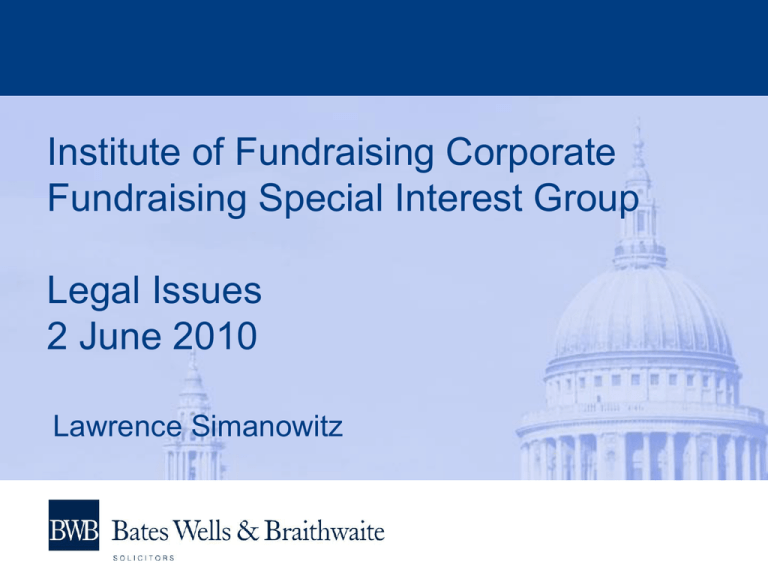
Institute of Fundraising Corporate Fundraising Special Interest Group Legal Issues 2 June 2010 Lawrence Simanowitz Partnerships not a legal partnership main forms – CRM (charity’s name associated with business services) – Business sponsorship (business name associated with charity’s services) Other forms joint venture – separate legal entity CRM Typical Arrangements 5p for every bar of soap sold …….. Bank affinity cards Retailer advertises staff fundraising CRM First Thoughts Logo is valuable asset Mutual benefit Be commercial (don’t undervalue) Reputation Suitable partner Due diligence CRM More thoughts Risk assessment Ethical guidelines Branding guidelines Corporate will usually be a “commercial participator” What is a Commercial Participator? Any person who: a) carries on for a gain a business other than a fund-raising business, but b) in the course of that business, engages in any promotional venture in the course of which it is represented that charitable contributions are to be given to or applied for the benefit of a charitable institution. Exception: charity trading subsidiaries Commercial Participator Where any representation that charitable contributions are to be given to or applied for the benefit of a charitable institution, the representation shall be accompanied by a statement clearly indicating: The name or names of the charities; If more than one, the proportions in which the charities will benefit; and The notifiable amount of money paid for goods or services which will be given to the charity; The notifiable amount of the proceeds of any other promotional venture to be given to the charity; or The notifiable amount of donations to be given by the commercial participator to the charity. The notifiable amount may be a total figure. Commercial Participator Statement Examples from OTS guidance [X%] of the purchase price will be donated to [Charity] For each item sold £[ ] will be donated to [charity] OTS guidance: www.cabinetoffice.gov.uk/third_sector/law_and_regulation Grey Area – Payment via a Trading Subsidiary How should the statement be worded if the commercial participator pays some or all of the money via the charity’s trading subsidiary? The requirement in the Act is to state the amount the charity will receive. BWB view: No requirement to refer to trading subsidiary if the amount will go to the charity and can be verified. Penalties Criminal offences committed by the commercial participator Weak enforcement Reputational issues for charity CRM – Tax implications CRM = a commercial trade not primary purpose to trade in name/ logo Therefore, any profit will be taxed, unless it falls within an exemption If not, use a trading company Supply is also subject to VAT, (special case for banks & insurance companies) CRM – Contract Issues The basics What do you/they have to do How much is being paid Is VAT included What are the payment dates When does the contract run from and to (some repeated below) CRM – Contract Issues Who is commercial participator (full details) - limited company? - partnership? - individual? Value of licence (don’t undercharge set policy minimum?) Exclusivity Beware restrictions on what the funds raised can be used for CRM – Contract Issues What product/service is being sold? (n.b. dangers endorsement or recommendation – vet statements) Insurance – e.g. TM infringement and product liability Is there a minimum sum? Is there a maximum sum? When will sums be paid? (clear calculations, payment methods, payment dates and penalties for late payment) CRM – Contract Issues How long will the relationship last? (start and finish dates) Is there agreement for earlier termination? Consequences of termination No variation without agreement (see next slide) does charity/trading company have to allow access to database or can it have access to corporate’s database? Who will have IP rights to use any revised or new database or materials? Branding guidelines? Confidentiality CP statement required by law Agreement between DCSF and Charity “Payment of this grant shall be subject to…… such further conditions and requirements that the Secretary of State may from time to time specify”. Business Sponsorship Introduction: Sponsorship v Philanthropy Sponsorship = reverse of CRM Charity accepts payment Charity does something in return E.g. puts sponsor’s name/logo on materials or gives hospitality benefits Beware mixed purpose (e.g. gallery’s educational material with high profile branding £2m therefore VAT + tax implications) Business Sponsorship Direct Tax Issues Profits do not derive from a primary purpose trade, therefore taxable Consider size and place of sponsor’s logo VAT issues for charity Simple acknowledgement = no VAT Placement of sponsor’s logo = VATable supply But remember one-off fundraising events Contractual Sponsorship Issues Most of the contractual issues previously discussed will apply Who owns the IP in materials produced (e.g. bank sponsoring new materials on debt) How is charity to advertise the sponsor’s logo? Does the sponsor also want to advertise their sponsorship: could they become a commercial participator? Lawrence Simanowitz LLP Partner Charity & Social Enterprise Department Bates Wells & Braithwaite London LLP 2 – 6 Cannon Street London EC4M 6YH Tel: 020 7551 7796 Fax: 020 7551 7800 Email: l.simanowitz@bwbllp.com
